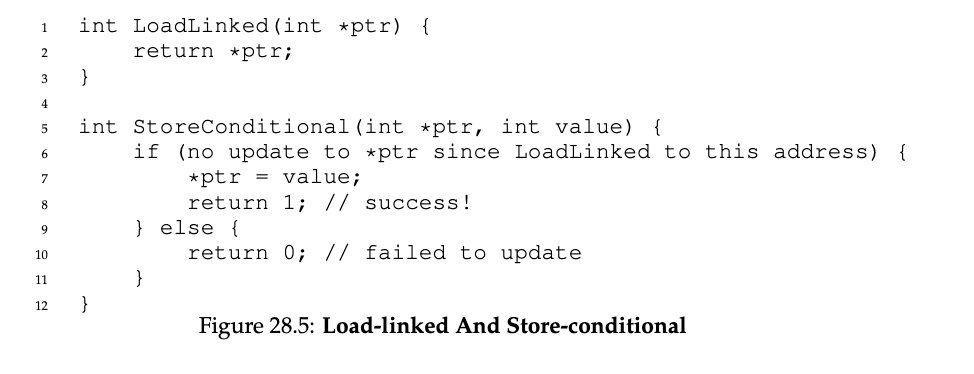Operating Systems: Three Easy Pieces Ch. 28
Locks
- Lock variable
- Calling lock → acquire the lock and enter the ciritical section
- thre thread acquire the lock called the owner of the lock
- Unlock → free the lock again
- Pthread locks
- Mutex → mutual exclusion between threads
- one thread is in the critical section, it excludes the others from entering until it has completed the section
- we may be using different locks to protect different variables (fine-grained)
- Mutual exclusion
- Fairness
- Performance
- Earliest solution → disable the interrupt
- simple
- need to perform a privileged operations
- Monopolize processor
- Different CPU → does not matter of disable interrupts, just go to other process
- Inefficient
- Just using load and store
- test flag is one and holds the lock
- simply spin-wait
- Problem
- correctness
- Both threads can be set to 1 and able to enter the ciritical section
- performance
- Spin-waiting waste the time
- correctness
- Spin locks with Test and sets
- test-and-set (or atomic exchange1) instruction
- Dekker’s algorithm
- Peterson’s algorithm
- returns the old value pointed to by the old ptr, and simultaneously updates said value to new
- Atomically operates
- By making both the test (of the old lock value) and set (of the new value) a single atomic operation, we ensure that only one thread acquires the lock.
- test-and-set (or atomic exchange1) instruction
- Evaluating Spin Locks
- Correctness → proved
- Fairenss → no fairenss guarantee
- Performance
- Single CPU → performance overhead
- Multiple CPUs → work well
- Compare-And-Swap
- Or Compare-And-Exchange
- The basic idea is for compare-and-swap to test whether the value at the address specified by ptr is equal to expected
- simply checks if the flag is 0 and if so, atomically swaps in a 1 thus acquiring the lock
- lock-free synchronization
- MIPS
- load-linked and store-conditional instructions can be used in tandem to build locks and other concurrent structures
- Load-linked
- store-conditional, which only succeeds if no intervening store to the address taken the place

- Fetch and add
- ticket lock
- uses a ticket and turn variable in combination to build a lock
- does an atomic fetch-and-add on the ticket value
- The globally shared lock->turn is then used to determine which thread’s turn it is
- it ensures progress for all threads\
- Spinning
- Waste of time slice doing nothing and check
- Yield approach
- we assume an operating system primitive yield()
- thread can call when it wants to give up the CPU and let another thread run
- move running to ready state → descheduling
- But potential waste still
- Sleeping instead of spinning
- park() to put a calling thread to sleep
- unpark(threadID) to wake a particular thread as designated by threadID
- old test-and-set idea with an explicit queue of lock waiters
- use a queue to help control who gets the lock next, thus avoiding starvation.
- Add to queue that does not get the lock
- calling the gettid() function
- Release the guard after park()
- flag does not get set back to 0 when another thread gets woken up
- a thread will be about to park, assuming that it should sleep until the lock is no longer held
- wakeup/waiting race
- setpark(). By calling this routine, a thread can indicate it is about to park.
- Priority inversion
- If I/O keep occurs on no lock thread, just keep spinning and take the CPU cycle
- a higher-priority thread waiting for a lower-priority thread → priority inheritance
- Different OS
- futex
- associated with it a specific physical memory location
- futex_wait
- futex_wake
- futex
- Two-Phase Lock
- spinning can be useful, particularly if the lock is about to be released
- Hybrid approach
- First Spin phase → lock is not acquired → second phase: caller is put to sleep, wake when lock become frees -